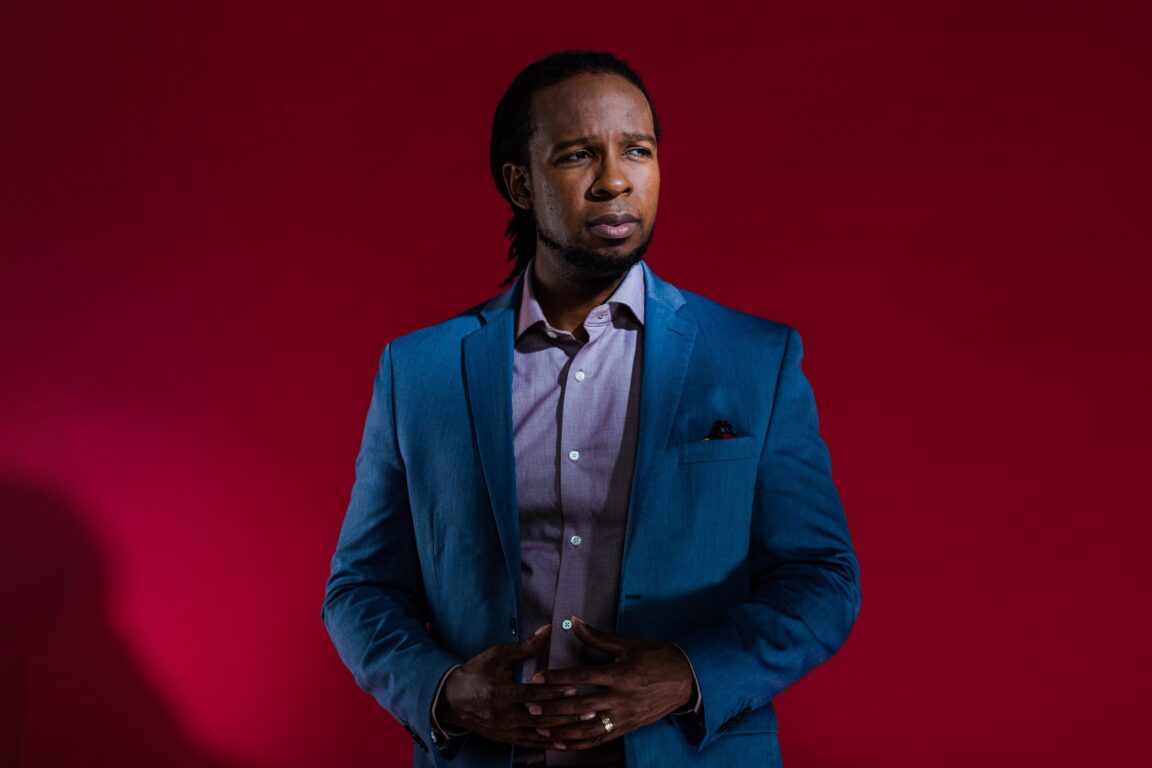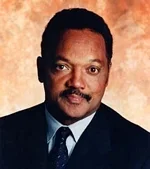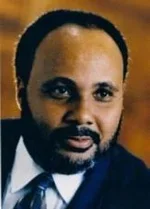On Martin Luther King, Jr. Day in January 1990, 200 people gathered on the plaza in front of the Business Building and at least 100 joined the march to the statehouse, marking the first time Boise State University recognized the national holiday. The march was organized and led by student Eric Love, who said, “The idea behind the protest was to let the administration know that there were students who felt that Martin Luther King’s ideas were important enough to celebrate as a holiday.”
Over time, the annual event, now known as the MLK Living Legacy Celebration, expanded from three days to one week. Between 1992 and 1999, the celebration won two Bronze Awards and one Gold Award for outstanding student involvement programs from the Council for the Advancement and Standards in Education. High profile civil rights activists Angela Davis, Desmond Tutu, Reverend Jesse Jackson and Rosa Parks are just a few of the many distinguished speakers who have appeared throughout the years to deliver the keynote address. In 2003, Danny Glover and Bill Fletcher addressed an audience of 2,500 people in the Pavilion (now the Taco Bell Arena).
Each year the celebration continues to underscore Boise State University’s commitment to upholding the values of respect and civility, encouraging all citizens to be responsible and fair. From workshops, films and lectures to exhibits and political demonstrations, educational programs continue to help raise awareness and promote human rights, calling for people everywhere to exercise their right to civil responsibility.
For a full history of the events leading to the Boise State tradition of MLK Living Legacy Celebration, click the following below to access the Albertsons Library archives.
Visit the archive of MLK Living Legacy Celebration history
Featured Past Speakers
The Boise State University Martin Luther King Jr. Human Rights Celebration has featured internationally known keynote speakers and human rights advocates such as Al Sharpton, Ibram X. Kendi, Jesse Jackson and Martin Luther King III. Explore the provided list for a glance at five of our featured speakers from the past three decades. To read about more keynote speakers, visit the Albertsons Library archives.
-

Ibram X. Kendi
2023 Keynote Speaker
Dr. Kendi is one of America’s foremost historians and leading antiracist scholars. He is a National Book Award-winning and #1 New York Times bestselling author of six books for adults and five books for children. Dr. Kendi is the Andrew W. Mellon Professor in the Humanities and the Founding Director of the Boston University Center for Antiracist Research. Dr. Kendi is a contributing writer at The Atlantic and a CBS News Racial Justice Contributor. He is the host of new action podcast Be Antiracist.
Dr. Kendi is one of America’s foremost historians and leading antiracist scholars. He is a National Book Award-winning and #1 New York Times bestselling author of six books for adults and five books for children. Dr. Kendi is the Andrew W. Mellon Professor in the Humanities and the Founding Director of the Boston University Center for Antiracist Research. Dr. Kendi is a contributing writer at The Atlantic and a CBS News Racial Justice Contributor. He is the host of new action podcast Be Antiracist.
-

Dr. Cornel West
2010 Keynote Speaker
Princeton professor of African-American studies, civil rights advocate, and author Dr. Cornel West drew an audience of 1,200, the first time that a keynote speaker for the MLK celebration has drawn over 1,000 people in several years. A well-known champion for social justice, West wrote “Race Matters,” a book that changed the course of America’s dialogue on race, justice and democracy when it was published in 1993.
Student organizations receiving funding through the MLK committee were required to present during the week, and their workshops were the highest attended. Four student groups made presentations on the King legacy and how it continues to impact us today: Organización de Estudiantes Latino Americanos; Black Student Alliance; Intertribal Native Council; and the International Student Alliance.
Princeton professor of African-American studies, civil rights advocate, and author Dr. Cornel West drew an audience of 1,200, the first time that a keynote speaker for the MLK celebration has drawn over 1,000 people in several years. A well-known champion for social justice, West wrote “Race Matters,” a book that changed the course of America’s dialogue on race, justice and democracy when it was published in 1993.
Student organizations receiving funding through the MLK committee were required to present during the week, and their workshops were the highest attended. Four student groups made presentations on the King legacy and how it continues to impact us today: Organización de Estudiantes Latino Americanos; Black Student Alliance; Intertribal Native Council; and the International Student Alliance.
-

Reverend Jesse Jackson
2007 Keynote Speaker
Reverend Jesse Louis Jackson, President and founder of the Rainbow/PUSH Coalition, is one of America’s foremost political figures. Over the past thirty years he has played a pivotal role in virtually every movement for empowerment, peace, civil rights, gender equality, and economic and social justice. Rev. Jackson has been called the “conscience of the nation” and “the great unifier,” challenging America to establish just and humane priorities. He is known for bringing people together on common ground across lines of race, class, gender, and belief.
Reverend Jesse Louis Jackson, President and founder of the Rainbow/PUSH Coalition, is one of America’s foremost political figures. Over the past thirty years he has played a pivotal role in virtually every movement for empowerment, peace, civil rights, gender equality, and economic and social justice. Rev. Jackson has been called the “conscience of the nation” and “the great unifier,” challenging America to establish just and humane priorities. He is known for bringing people together on common ground across lines of race, class, gender, and belief.
-

Martin Luther King, III
2005 Keynote Speaker
President and CEO of the King Center in Atlanta, Georgia, Martin Luther King, III continues to follow in the footsteps of his late father, Dr. Martin Luther King, Jr. Martin Luther King, III’s dedication to promoting nonviolence action to rid the world of social, political, and economic injustice has propelled him to the forefront as one of the nation’s most ardent advocates for the oppressed and the disillusioned. He was instrumental in getting Georgia legislators to change the state’s flag, an offensive and divisive symbol for many Georgians. In the 1980’s, King was incarcerated for protesting against injustice in South Africa, and for supporting the freedom of Nelson Mandela. Throughout the 1990’s, he addressed the moral and political dilemmas of Haiti, Nigeria, and Sierra Leone. He has spoken to the United Nation on behalf of individuals living with AIDS, and has proactively confronted racial profiling by conducting hearings that led to the passage of anti-racial profiling resolutions.
President and CEO of the King Center in Atlanta, Georgia, Martin Luther King, III continues to follow in the footsteps of his late father, Dr. Martin Luther King, Jr. Martin Luther King, III’s dedication to promoting nonviolence action to rid the world of social, political, and economic injustice has propelled him to the forefront as one of the nation’s most ardent advocates for the oppressed and the disillusioned. He was instrumental in getting Georgia legislators to change the state’s flag, an offensive and divisive symbol for many Georgians. In the 1980’s, King was incarcerated for protesting against injustice in South Africa, and for supporting the freedom of Nelson Mandela. Throughout the 1990’s, he addressed the moral and political dilemmas of Haiti, Nigeria, and Sierra Leone. He has spoken to the United Nation on behalf of individuals living with AIDS, and has proactively confronted racial profiling by conducting hearings that led to the passage of anti-racial profiling resolutions.
-

Angela Davis
2001 Keynote Speaker
Angela Davis is known internationally for her ongoing work to combat all forms of oppression in the United States and abroad. Over the years, she has been active as a student, teacher, writer, scholar, and activist. She is a living witness to the historical struggles of the contemporary era. Davis’ political activism began when she was a youngster in Birmingham, Alabama, and continued through her high school years in New York. But it was not until 1969 that she came into national attention after being removed from her teaching position in the Philosophy Department at UCLA as a result of her social activism. Today, Angel Davis is a tenured professor at the University of California, Santa Cruz. Her articles and essays have appeared in numerous journals and anthologies, and she is the author of five books including Woman, Race, and Class; and Blues Legacies and Black Feminism: Gertrude “Ma” Rainey, Bessie Smith and Billie Holiday.
Angela Davis is known internationally for her ongoing work to combat all forms of oppression in the United States and abroad. Over the years, she has been active as a student, teacher, writer, scholar, and activist. She is a living witness to the historical struggles of the contemporary era. Davis’ political activism began when she was a youngster in Birmingham, Alabama, and continued through her high school years in New York. But it was not until 1969 that she came into national attention after being removed from her teaching position in the Philosophy Department at UCLA as a result of her social activism. Today, Angel Davis is a tenured professor at the University of California, Santa Cruz. Her articles and essays have appeared in numerous journals and anthologies, and she is the author of five books including Woman, Race, and Class; and Blues Legacies and Black Feminism: Gertrude “Ma” Rainey, Bessie Smith and Billie Holiday.